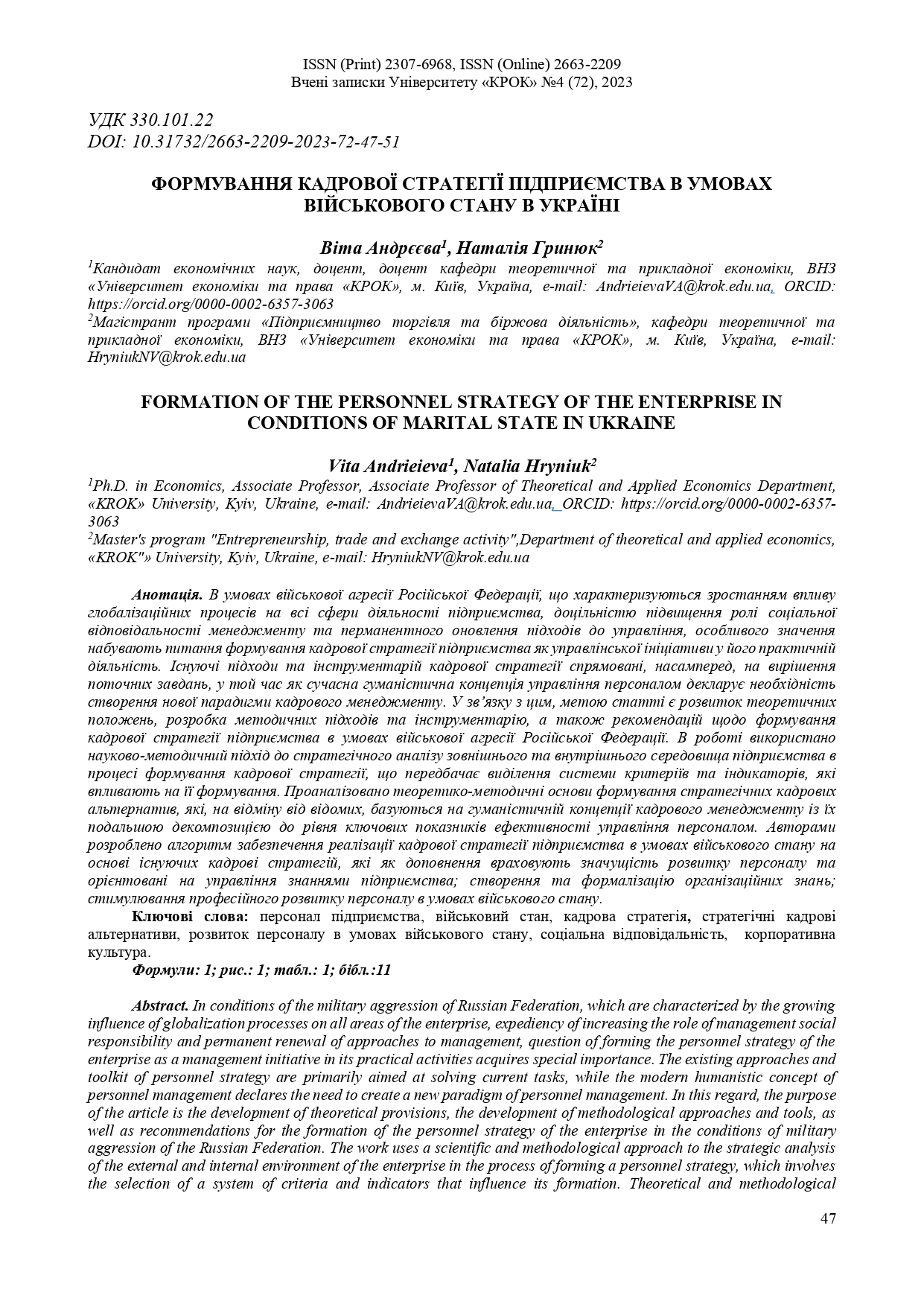FORMATION OF THE PERSONNEL STRATEGY OF THE ENTERPRISE IN CONDITIONS OF MARITAL STATE IN UKRAINE
DOI:
https://doi.org/10.31732/2663-2209-2023-72-47-51Keywords:
company personnel, martial law, personnel strategy, strategic personnel alternatives, personnel development under martial law, social responsibility, corporate cultureAbstract
In conditions of the military aggression of Russian Federation, which are characterized by the growing influence of globalization processes on all areas of the enterprise, expediency of increasing the role of management social responsibility and permanent renewal of approaches to management, question of forming the personnel strategy of the enterprise as a management initiative in its practical activities acquires special importance. The existing approaches and toolkit of personnel strategy are primarily aimed at solving current tasks, while the modern humanistic concept of personnel management declares the need to create a new paradigm of personnel management. In this regard, the purpose of the article is the development of theoretical provisions, the development of methodological approaches and tools, as well as recommendations for the formation of the personnel strategy of the enterprise in the conditions of military aggression of the Russian Federation. The work uses a scientific and methodological approach to the strategic analysis of the external and internal environment of the enterprise in the process of forming a personnel strategy, which involves the selection of a system of criteria and indicators that influence its formation. Theoretical and methodological foundations of strategic personnel alternatives formation, which, unlike the known ones, are based on personnel management humanistic concept with their subsequent decomposition to the level of key indicators of personnel management efficiency, are analyzed. The authors have developed an algorithm for ensuring the implementation of company's personnel strategy in the conditions of martial law based on existing personnel strategies, which additionally take into account the importance of personnel development and are oriented to management of the company's knowledge; creation and formalization of organizational knowledge; stimulation of professional development of personnel under martial law.
Downloads
References
Armstrong, M. (2010). Armstrong's Handbook of Performance Management, 4 th Edition. New Delhi: Kogan Page Limited, London. 238 р.
Clady A. (2005). Reputation, Goodwill, and loss: Entering the Employee Training Audit Equation. 304 р.
Терон І. В. (2015). Корпоративна культура в механізмах регулювання соціально-трудових відносин. Глобальні та національні проблеми економіки. № 6. С. 639-643.
Отенко І. В., Чепелюк М. В. (2018). Корпоративна культура: міжнародний та трансформаційний аспекти: монографія. Х.: ХНЕУ ім. С. Кузнеця. 243 с.
Дмитренко М. Й. (2014). Корпоративна культура: біхевіоральний і праксеологічний аспекти. Вісник Житомирського державного університету. № 5. С. 3–7.
Семикіна М. В. (2009). Еволюція організаційної культури на українських підприємствах: проблеми та протиріччя. Держава та регіони. Серія: Економіка та підприємництво № 6. С. 197–200.
Бодрий Я. А. (2020). Тенденції та ефективність використання персоналу аграрних підприємств в умовах економічної кризи. Причорноморські економічні студії. № 52 (1). С. 116-121.
Бей Г. В., Середа Г. В. (2019). Трансформація HR-технологій під впливом цифровізації бізнес-процесів. Економіка і організація управління. № 2 (34). С. 93-101.
Балуєва О. В., Снопенко Г. В. (2020). Трансформація функції управління персоналом: сучасні тренди. Ефективна економіка. № 12. С.16-24. DOI: 10.32702/2307-2105-2020.12.10 .
Брич В., Борисяк О., Білоус Л., Галиш Н. (2020). Трансформація системи управління персоналом підприємств: монографія. Тернопіль: ВПЦ “Економічна думка ТНЕУ”. 212 с.
Красота О. В., Андрєєва В. А. (2021). Соціальне підприємництво як інструмент соціальної інклюзії в умовах економічної невизначеності: колективна монографія. Київ : ВНЗ «Університет економіки та права «КРОК». С. 257-271.

Downloads
Published
How to Cite
Issue
Section
License

This work is licensed under a Creative Commons Attribution-NonCommercial 4.0 International License.

